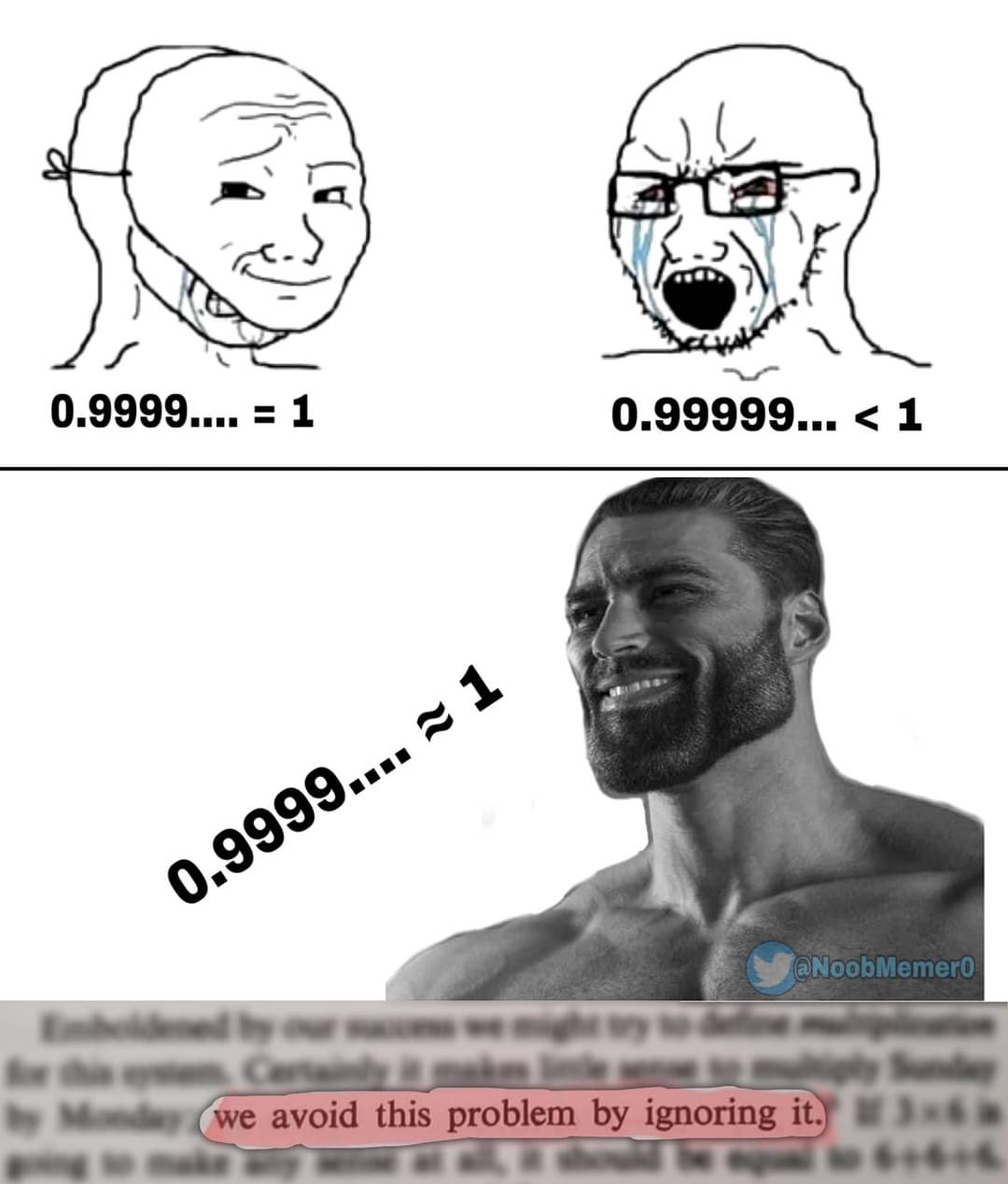this post was submitted on 27 Jun 2024
796 points (95.1% liked)
Science Memes
11068 readers
3082 users here now
Welcome to c/science_memes @ Mander.xyz!
A place for majestic STEMLORD peacocking, as well as memes about the realities of working in a lab.

Rules
- Don't throw mud. Behave like an intellectual and remember the human.
- Keep it rooted (on topic).
- No spam.
- Infographics welcome, get schooled.
This is a science community. We use the Dawkins definition of meme.
Research Committee
Other Mander Communities
Science and Research
Biology and Life Sciences
- !abiogenesis@mander.xyz
- !animal-behavior@mander.xyz
- !anthropology@mander.xyz
- !arachnology@mander.xyz
- !balconygardening@slrpnk.net
- !biodiversity@mander.xyz
- !biology@mander.xyz
- !biophysics@mander.xyz
- !botany@mander.xyz
- !ecology@mander.xyz
- !entomology@mander.xyz
- !fermentation@mander.xyz
- !herpetology@mander.xyz
- !houseplants@mander.xyz
- !medicine@mander.xyz
- !microscopy@mander.xyz
- !mycology@mander.xyz
- !nudibranchs@mander.xyz
- !nutrition@mander.xyz
- !palaeoecology@mander.xyz
- !palaeontology@mander.xyz
- !photosynthesis@mander.xyz
- !plantid@mander.xyz
- !plants@mander.xyz
- !reptiles and amphibians@mander.xyz
Physical Sciences
- !astronomy@mander.xyz
- !chemistry@mander.xyz
- !earthscience@mander.xyz
- !geography@mander.xyz
- !geospatial@mander.xyz
- !nuclear@mander.xyz
- !physics@mander.xyz
- !quantum-computing@mander.xyz
- !spectroscopy@mander.xyz
Humanities and Social Sciences
Practical and Applied Sciences
- !exercise-and sports-science@mander.xyz
- !gardening@mander.xyz
- !self sufficiency@mander.xyz
- !soilscience@slrpnk.net
- !terrariums@mander.xyz
- !timelapse@mander.xyz
Memes
Miscellaneous
founded 2 years ago
MODERATORS
you are viewing a single comment's thread
view the rest of the comments
view the rest of the comments

0.999... / 3 = 0.333... 1 / 3 = 0.333... Ergo 1 = 0.999...
(Or see algebraic proof by @Valthorn@feddit.nu)
If the difference between two numbers is so infinitesimally small they are in essence mathematically equal, then I see no reason to not address then as such.
If you tried to make a plank of wood 0.999...m long (and had the tools to do so), you'd soon find out the universe won't let you arbitrarily go on to infinity. You'd find that when you got to the planck length, you'd have to either round up the previous digit, resolving to 1, or stop at the last 9.
Except it isn't infinitesimally smaller at all. 0.999... is exactly 1, not at all less than 1. That's the power of infinity. If you wanted to make a wooden board exactly 0.999... m long, you would need to make a board exactly 1 m long (which presents its own challenges).
It is mathematically equal to one, but it isn't physically one. If you wrote out 0.999... out to infinity, it'd never just suddenly round up to 1.
But the point I was trying to make is that I agree with the interpretation of the meme in that the above distinction literally doesn't matter - you could use either in a calculation and the answer wouldn't (or at least shouldn't) change.
That's pretty much the point I was trying to make in proving how little the difference makes in reality - that the universe wouldn't let you explore the infinity between the two, so at some point you would have to round to 1m, or go to a number 1x planck length below 1m.
It is physically equal to 1. Infinity goes on forever, and so there is no physical difference.
It's not that it makes almost no difference. There is no difference because the values are identical. There is no infinity between the two values.
Again, if you started writing 0.999... on a piece of paper, it would never suddenly become 1, it would always be 0.999... - you know that to be true without even trying it.
The difference is virtually nonexistent, and that is what makes them mathematically equal, but there is a difference, otherwise there wouldn't be an infinitely long string of 9s between the two.
Sure, but you're equivocating two things that aren't the same. Until you've written infinity 9s, you haven't written the number yet. Once you do, the number you will have written will be exactly the number 1, because they are exactly the same. The difference between all the nines you could write in one thousand lifetimes and 0.999... is like the difference between a cup of sand and all of spacetime.
Or think of it another way. Forget infinity for a moment. Think of 0.999... as all the nines. All of them contained in the number 1. There's always one more, right? No, there isn't, because 1 contains all of them. There are no more nines not included in the number 1. That's why they are identical.